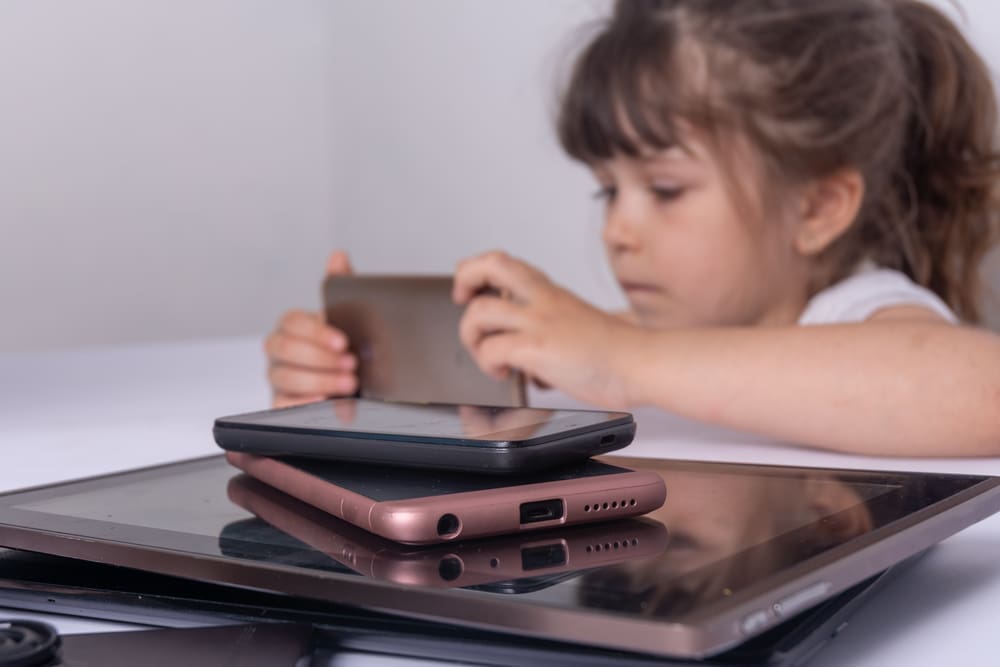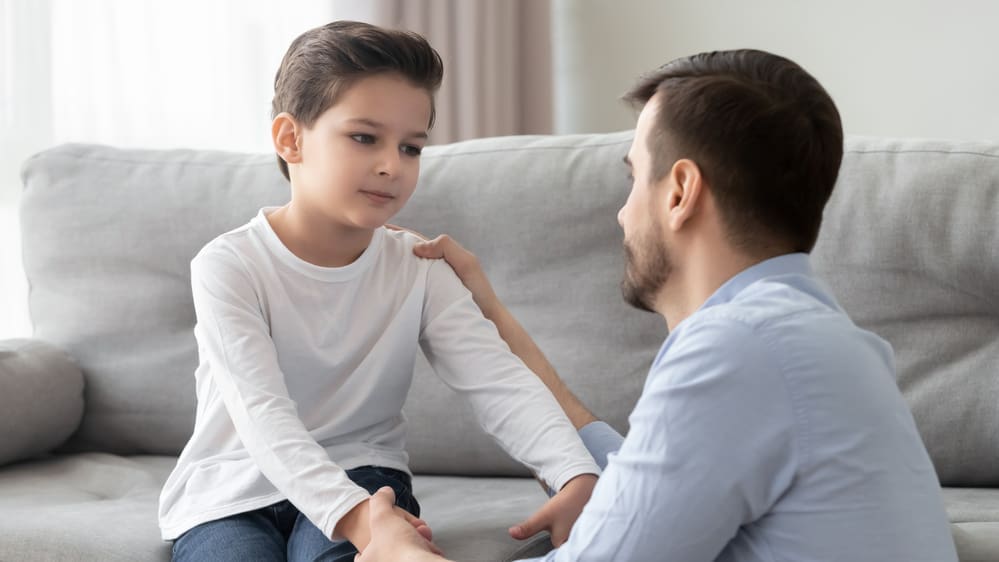How & Why To Have The ‘PORN’ Conversation With Your Muslim Kids

“Can we play Squid Game?” a 6-year-old asked me during recess. I was taken aback and asked her what she knew about the show. She told me she watches it with her teenage sibling. Squid Game is currently the number 1 hit show from Korea streaming on Netflix. The plot involves hundreds of South Koreans, trapped in poverty and debt, playing deadly children’s games to win a million-dollar prize. Elementary-aged Muslim children are watching this series which is baffling considering the caption of the series warns of language, violence, sex, nudity, suicide, and smoking. Given that our community is not engaging enough with issues such as youth culture, social media, and pornography, this did not come as a big surprise to me, but it saddened me all the same.
There is also a lot of ‘not my child,’ ‘I trust my child’ or ‘head in the sand’ syndrome, which leaves children very vulnerable to peer pressure and porn addiction. We need to become more attentive, engaged, and intentional as Muslim parents because we are raising children in a world where sending nudes is a regular normalized activity starting in elementary school. A pornified environment through TV, movies, music and social media surrounds them.
Adult content used to be found in ‘dirty magazines’ tucked out of view in a corner shop or ‘dirty movies’ only accessible in a separate room in video stores. Not anymore. Press a link or swipe a screen, and you have access to explicit content which is violent, brutal, degrading, and often free.
So yes, Muslim children send nudes, watch porn, and even experience porn addiction. It is a growing problem in our communities, and your religiousness does not make you immune to resisting porn. I know practicing Muslims struggling with porn addiction, including an imam.
The first exposure for children to porn is usually accidental, and the average age this happens is at eight years old. However, by age 14, more than 90% of children have seen porn. The average age of children getting smartphones has dropped over the past years. Daily activity is snapped, filtered, posted, shared, and repeated every day.
With exposure to devices everywhere, your child will inevitably stumble upon or see porn via peers. Porn is not just a ‘boy’ problem as it is harmful to both genders though boys are still more significant consumers of porn than girls.
All the social media platforms can be gateways to pornography. There are pornbots on Instagram attempting to lure users to porn-affiliated websites. Profanity is present and explicit content widely available on TikTok. A recent podcast I listened to interviewed a teen addicted to porn from Pinterest. I bet you thought it was just home decorating and food!
Even the gaming industry is affected. Roblox, a massive multiplayer online game, is very popular amongst children. Most games are ‘user generated’ so difficult to monitor, and simulated sex acts are on the platform. There is a lot of sexualized imagery in video games, and porn bots have infiltrated Playstation and Xbox.
Remember, the porn industry is looking for lifelong customers, so targeting children. Viewing porn is not something only ‘bad’ kids do. All kids are vulnerable to getting sucked into it.
What are the effects of pornography on our children?
- It can cause girls to internalize and normalize sexual objectification, damaging self-esteem. Girls see their value as being sexual objects needing male attention. Celebrity culture encourages and celebrates a fixation on our outward appearances, which is toxic.
- Porn does not depict a loving, mutually respectful real-life relationship. Instead, it shows an unhealthy non-consensual sexual relationship where men dominate and degrade women in an aggressive way.
- Viewing this sexual violence damages and rewires children’s developing brains, which are more susceptible to addiction.
- Pornography is devoid of romantic love because there is no love with sex in porn. Porn has led to the ‘hooking up’ or ‘friends with benefits’ cultural phenomenon. It can damage future relationships because individuals prefer porn over being intimate with a real person.
- It feeds toxic masculinity, and the ‘boys will be boys’ mindset is very disrespectful to girls. It sets up unrealistic expectations and behavior, leading to increasing sexually aggressive behavior linked to porn.
- It is addictive, and the more you watch it, the greater your need becomes for more extreme forms of porn to be aroused.
- It leads to anxiety, depression, and mental health issues.
What can a parent do?
1. Talk about Porn
Our modesty tradition and cultural upbringing have made us uncomfortable having conversations about sex and pornography. It’s okay to be awkward talking about it and acknowledge that discomfort with your children. The discomfort lessens over time. These conversations will protect and empower your children to make better decisions with delaying sex and rejecting pornography.
2. Monitor their digital access
Keeping the TV and all devices in family-friendly public spaces and filtering software to block explicit content is essential. However, a vital protective strategy is to have layered, consistent conversations with your sons and daughters early on.
They need to learn what porn is in an age-appropriate way, identify it, understand how it harms their brain, and what to do if they see it. If you do find your child watching porn, remain calm, supportive and loving. No child wants to be consumed by watching porn. Your child may be relieved to not have the burden of facing this alone.
3. Help them develop their internal filter
Ultimately, we want to develop our children’s ‘internal filters’ to make good choices when they are alone or with peers.
How does a parent strengthen this internal filter?
By raising resilient children and supporting their attachment to you. Resilience is the ability to cope and adapt to adversity and stress. It starts by teaching self-discipline when they are young. You are giving them ownership over a rule.
For example, “if you want to play outside, put the toys away first.” Self-discipline helps children learn delayed gratification and not give in to temptation, so for example; they can forgo a TV show to study for a test.
Self-discipline will strengthen their control over their ‘thinking’ brain instead of their ‘feeling’ brain, which will help them resist the pull of pornography in their teens.
4. Your home is a training ground
They need to learn and practice these skills by you giving them choices, routines, limits, and consequences. Letting them experience failure also builds resilience. We don’t need to always protect our children from challenges or obstacles. This will help them learn coping skills instead of viewing pornography to cope with life’s stresses.
5. Foster resilience
Resilience is also fostered through helping children become emotionally intelligent by learning to identify and handle their emotions and earning praise for good behavior. Emotional intelligence helps manage emotions from the ‘thinking’ brain, which reduces shame, making it easier to overcome porn addiction.
6. Strengthen connections
It is always easier to influence your children when you connect with them before correcting them. Strengthen their attachment to you by letting them feel seen, heard, and loved. Strengthen their connection to Allah by nurturing a relationship with Him based on love which develops God-consciousness (taqwa) and a desire to please Al-Baseer (the All-Seeing).
We need to reclaim sexuality as a blessing the way Allah intended and take power away from its degradation in society. Prophet Muhammad (SAW) did not shy away from topics of sex so neither should we. Parenting from a place of faith, not fear will give you hope, patience and understanding. The one thing that kids addicted to porn had in common was that they had parents who didn’t talk to them about porn. Are you ready to start the conversation?



